Published in February 2019, this article from Roderick Stanley in Good Trouble looks at a cross-section of New York City activist groups.
New York City is home to hundreds of activist groups, some of which have been at the frontlines for decades and some that are newer to the fight. One day, eight organisations, 14 people…This is a cross-section of what resistance – New York style – looks like in 2018.
Photography Dan Martensen / Interviews Roderick Stanley
RAVI RAGBIR, NEW SANCTUARY
Since 2007, the New Sanctuary Coalition of NYC has grown into a city-wide movement working to reform immigration enforcement. Its executive director Ravi Ragbir has been fighting deportation since 2006, following a conviction for wire fraud. ICE had agreed to defer his deportation while Ravi, a lawful permanent resident who came to the US from Trinidad in 1991, fought questions around his conviction in court – but on January 11 of 2018 they detained him during a routine check-in and attempted to deport him.
One day before his flight, a US District Judge ordered he be freed, while attorneys for Ravi have since claimed he was targeted by ICE because of his high-profile activism. This past week, on January 28, 2019, Ravi – accompanied by community members, elected officials and friends – successfully completed his latest six-monthly ICE check in. Among his supporters was U.S. Rep Yvette Clarke of Brooklyn who, after witnessing the disturbing treatment of Ravi by Federal Protective Service officers, is inquiring into the enforcement arms of Department of Homeland Security. Ravi’s case remains pending. (All the below interviews were conducted in summer 2018.)

How has your role in the immigration rights fight changed in the last couple of years?
I never wanted to be a public figure. A lot of my training is teaching [supporters] how to speak for others. So, it was never my intent to be the face of this, but I am in a similar situation many people are in, and I am able to speak for them because a lot of them are terrified. They are living in fear and they break down. I break down a lot. People knew the change in administration would impact hard… I think they would have taken me away last year, but they weren’t sure how to. In the last year, it became real for a lot of people. It became real for me and it became real for supporters along with me. Yes, I’ve been moved into the spotlight, but I’m using this moment to pull people from being protestors to really standing up.
“When we speak about ourselves, we are victims. When we start talking about others, we start to become leaders. We start to make change.”
You would be forgiven for focusing on your own situation. What made you decide you wanted to speak for others in similar situations?
Yes, it’s easy to speak about ourselves. The problem is that when we speak about ourselves, we are victims. When we start talking about others, we start to become leaders. We start to make change. We cannot allow this system to continue the way it is… We need to dismantle and abolish ICE.
Do you think your activism has made you a target for ICE?
If we are not targeted, it means we are not doing the right job. The Deputy Director says he knows exactly where I live. He described my house and street when he was talking to some of my Leaders – and you don’t take things personally unless you are targeting that person. So, yes – I am a target because of my activism, because of my training people, bringing this to the light. Let us use this opportunity, as I continue to become the target.
“Not at a later date, we need to deal with it. We are going to deal with it. Everyone has a role to play to stop this.”
Use their actions against them?
Correct. Because we are learning what they have been doing and highlighting what they are doing, showing how violent they are.
There are headlines at the moment about the separation of families at borders. Do you think the character of this country has changed in the last couple of years, or is this something that is now being allowed to come out into the open?
I think it was always there. If you read Michelle Alexander’s book The New Jim Crow, you will see the insidious ways we have used the laws to affect people of colour. Still, America is the place where (immigrants) can find opportunities. But the question you ask me, has it been here? It has, and the president validates the hatred. It passes the buck, “The president says it, so I’m allowed to say it…” It gives them an opening to not only say stupid things, racist things, but to act – because he is giving them the okay.
So he ripped off a façade that was covering a lot of the darkness and hatred in America…
Maybe getting this out into the open is like pus from a wound or something – like now that it’s exposed we can deal with it. I mean that optimistically. But we have to deal with it. Not at a later date, we need to deal with it. We are going to deal with it. Everyone has a role to play to stop this. To clean that wound and to get rid of that pus.
You’ve been fighting this for 12 years. What gives you the strength to continue?
Family. My daughter was the main reason I fought to be here. And supporters. There are times when I want to give up but I remember how much people have given up for me. So, I cannot disappoint them. The other aspect is that I actually put it aside. I kind of bottle it up, box it up, and don’t deal with it. My wife will tell you that I deal with it badly.
What can others do to support you and others in this situation?
If you are a reader who is a citizen of the country you are in, whether Britain or America, you have a privilege, but it does not mean you are the Messiah. So going in with an attitude that “I am going to save you” is not the way to solve this. Taking someone who doesn’t know the process and teaching them the process so they are not afraid, but you are standing with them, because of privilege the policy does not affect you… Being there in that space is a hurdle that the agency has to overcome. That’s one way.
What do you think of when you think of Trinidad?
I haven’t been in Trinidad since this began – so 19, 20 years. Trinidad is a wonderful country. That is the privilege I have, I can go back and not be afraid for my life. People from Honduras, Guatemala and Mexico don’t have that. If they are too public here, their families lives are going to be at risk down there. That is why I am fighting – the process is inhumane.
What are your favourite things about living in New York?
New Yorkers. I will strike up conversation because you meet so many interesting people in the subway, on the streets. I hand out my cards to people and say, “If you know anyone who needs help, send them to us.” New York conversations are so mind-blowing. I explain to people who want to come visit – I say, just sit down and New York moves around you.
DARIAN AGOSTINI AND REIGN ROLON, MAKE THE ROAD NY
Make the Road New York builds the power of immigrant and working-class communities to achieve dignity and justice.

Tell us a bit about yourselves and your work…
Darian Agostini: I’m 23. Spent most of my life in Flatbush, being around this really black, immigrant, Caribbean culture. My own family had police officers come to my house when I was a kid, and do some really messed up stuff with my dad. I experienced hyper-aggressive policing since I was 13. I think in my senior year, that all crystallised with Trayvon Martin. Trayvon was killed through similar practice. I looked at Trayvon and just thought, This is my life. What separates me from Trayvon?I got a summer job at Make the Road NY. And I listened to people talk about the same things I was talking about. Like, why do we see all these police in our schools and neighbourhoods? Why don’t we have that same funding for education? Why are folks in our communities going through poverty and homelessness and drug addiction? And how do we solve some of these problems? So I joined the part of the organisation focusing on policing work. To this day, we do a lot of work that connects with the families of people who have been killed by police. The list, sadly, continues to grow.

Reign Rolon: I’m 19. Born and raised in East New York, which at one point was the crime capital of Brooklyn. It’s still kind of considered that. I’m black, but I’m Puerto Rican. I went to high school in Flatbush. And I feel like my high school years, it was like this realisation of, Oh shit, I’m black. I felt this in between-ness. My senior year of high school, I was in mad debates! My teacher really liked the fact I was doing that stuff. This internship programme came. I was not interested. She would show me the application and be like, it’d be cool if you signed up. Then she just kept appearing, lunchroom, drama class, everywhere she knew I would be at. So, I was like, yo, let me sign up to get this lady out my face. They tell me they’re sending me to Make the Road. I thought it was a construction company! So I showed up. And it was the first time I was surrounded by community folk. Like, I don’t know how to put it. They just resonated with me. And I didn’t feel I was always being challenged in the idea of what my blackness is. I don’t know, it just felt mad beautiful. It gives me hope, and this sense of community love.
Why do you think is it important to be involved in activism right now?

Darian: Our communities have always been repressed, as far back as slavery. One of the strategic principles of slavery was that people who were enslaved were not gonna be able to read and write. So they weren’t going to be able to spread ideas, specifically about freedom, liberation, justice, equality. These were things our communities were isolated from. So right now it’s important, specifically for young people of colour, to talk and take that message centre-stage. Because young people have always led change in society. If we don’t, who does?
Is policing getting better or worse?
“Everything about the inception of policing in the US started from slave patrols. To disrupt, dismantle and destabilize the small communities freed black peoples had… Ultimately, the police are not institutions of safety for us.”
Reign: I feel it’s not gonna get better ‘till it disappears. ‘Till it’s just gone in general. ‘Cause policing is totally, totally rooted in racism. It’s like, no matter how we shift power back to people, they will always be racist, and something’s always gonna be happening to bodies of colour, black bodies. It’s fucked up. The history of the NYPD is so violent.
Darian: James Baldwin said, ‘Their very presence is an insult … even if they spent their entire day feeding gumdrops to children. They represent the force of the white world … to keep the black man … in his place.” Everything about the inception of policing in the US started from slave patrols. To disrupt, dismantle and destabilize the small communities freed black peoples had… Ultimately, the police are not institutions of safety for us.
What are the things you like most about New York?
Darian: In a city that’s made for elites and corporations, really poor people have been able to survive. And not only that, but resist, powerfully. Resist oppression, resist the neglect the government has handed out to our communities. We’re becoming more powerful with every generation.
JACK KUPFERMAN, GRAY PANTHERS
The Gray Panthers fight ageism and other social justice issues. Activist Maggie Kuhn formed the movement in response to being forced to retire from her job at the age of 65, all the way back in 1970.
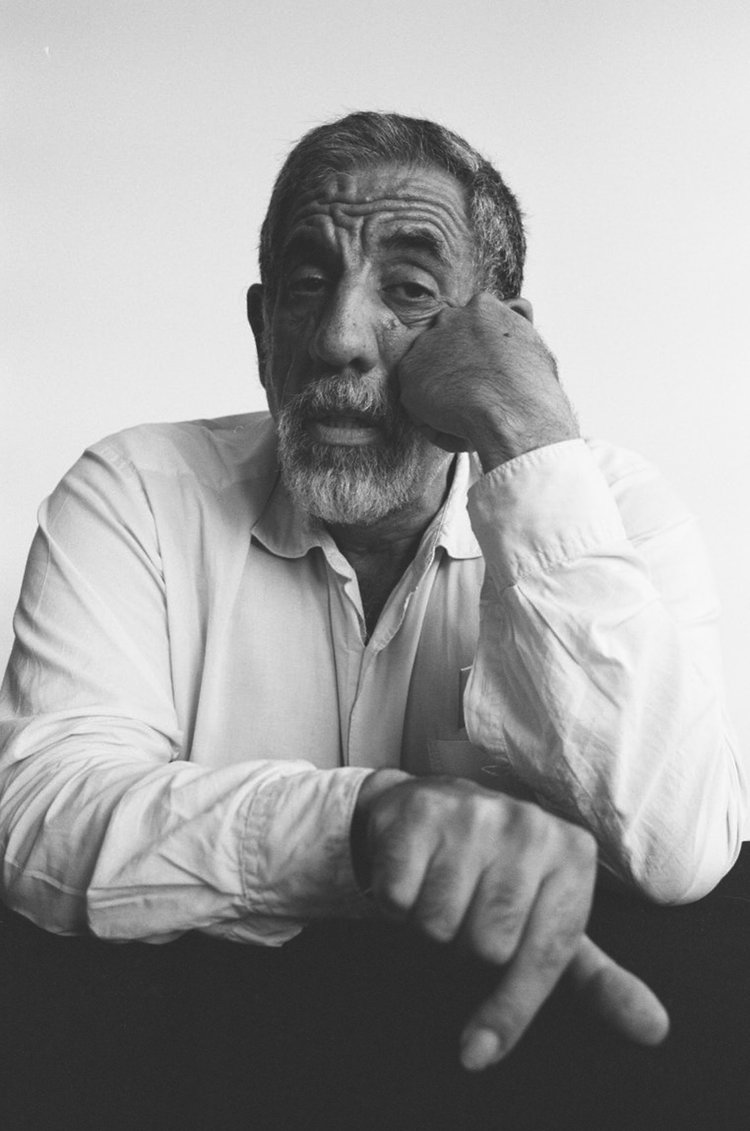
Tell us about yourself.
I’ve been working with older people longer than anyone has ever been old. And that is not an exaggeration. My parents owned a rest home in Rockland County, so from the age of three until now – I’m 63 – I’ve been working with older people. All my adult life, I’ve been an attorney. The real satisfaction in life for me is the opportunity to improve the quality of life for older persons.
How did you get involved with the Gray Panthers?
Gray Panthers has been around since the 70s and the time of those big movements, civil rights, women’s, gay liberation, all of them, when the country was in such turmoil as it is now. Maggie Kuhn was one of my heroes, I learned about her in college. The opportunity came to me about 12 years ago.
Ageism is a less discussed issue.
Ageism is the under acknowledged “ism” – because nobody hates old people, they just ignore them. On top of that, there has never been a cohort of a billion people who are now over the age of 60. One billion globally! If you’re lucky, you’ll be one of them. It is an “ism” by invisibility. If we improve the quality of life for older people, we improve the quality of life for everyone.
“Intergenerational collaboration. Working together as equals. Older people need to be more respectful of younger people and vice versa.”
What kind of actions do you take?
Recently, we’ve been doing a lot of street stuff, of course for healthcare. Most issues have a component of age, and and we look at everything through the lens of ageism. How often do you seek out people of an age greater than your own and presume their abilities are at least equal? Older people are resources, not burdens. I would encourage you to go to our website, scroll all the way down – there is a video on centenarians. I promise you that will be at least as much fun for you as the rest of this day.
Are older people an under-celebrated part of the protest movement?
If you look carefully, (in) almost any movement, the worker bees are the older people. When people are 70, they have the time, which is one of the points Maggie Kuhn made. We’ve got the time, so let’s put it to productive use.
What message do you have to younger readers?
Intergenerational collaboration. Working together as equals. Older people need to be more respectful of younger people and vice versa. We’re in terrible times. One of the few ways to deal with that is to try to do something – we can’t have bystanders.
Best thing about New York?
This is the place where things happen and there is so much beauty and toughness at the same time. I’m so fortunate to be living here.
ANDY RATTO, RISE & RESIST
Rise and Resist is a direct action group committed to opposing, disrupting and defeating any government act that threatens democracy, equality and our civil liberties.
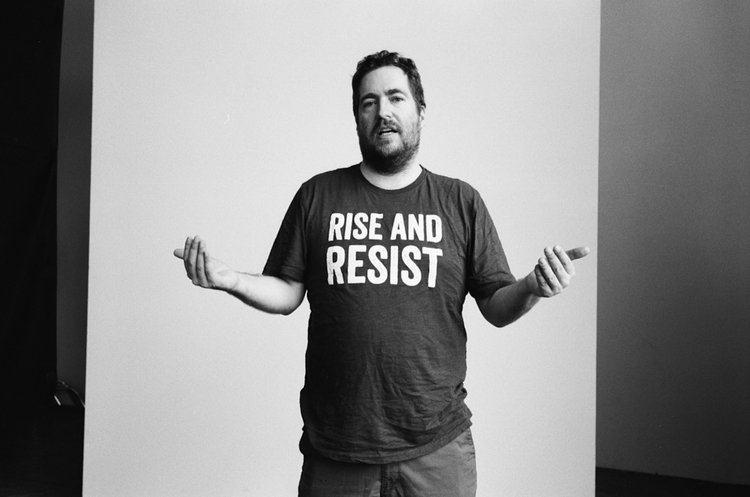
Tell us a bit about yourself…
I grew up in California and went to school at UC Berkeley. There is a strong history of activism there. Other places I’ve lived are Jerusalem, Atlanta, now New York. I’ve had the opportunity to do organising around the Israeli-Palestinian conflict, environmentalism, with Occupy, and now with Rise and Resist.
“If you’ve been wondering, ‘What might I have done at previous moments in history?’ This is one of those moments.”
What is Rise & Resist’s mission?
We grew out of the 2016 election, though a lot of us were not new to activism. We feel it’s important to empower people and activate them and bring together like-minded people to do organising. Street protests, raising attention around the issues. I have been trained in civil disobedience. I have been arrested before. People from Ride and Resist came from ACT UP and the anti-nuclear movement and other movements like Occupy.
Why are these issues important to you?
If you’ve been wondering, ‘What might I have done at previous moments in history?’ This is one of those moments. They’re taking children away from their parents at the border. They’ve come here seeking refuge, seeking asylum from dangerous situations, and our government is snatching crying children and taking them who knows where, housing them in places reported to have awful conditions. What are the actions we can all take? For Rise and Resist, that has meant public actions, visual actions, often with the risk of arrest.
How important do you think it is for people to be trained in civil disobedience?
Especially with Black Lives Matter, what we’ve seen repeatedly is people filming instances of police brutality and violence and even murder, often at great personal risk to themselves. People have faced arrest at that moment, or long-term police targeting or harassment. For the sort of actions Rise and Resist plans in advance, we like people to be educated for a number of reasons. One, it’s important to assert your rights throughout the process. Also, it’s important for people to not put other people at risk who are trying to avoid that situation.
What are the best things about living in New York?
There is a large, diverse population here that I’ve been able to collaborate with. We brought together the Reclaim Pride Coalition that’s geared around making the New York Pride march in Manhattan less about corporations and having less police presence. Second, I love the food. It’s one aspect that I think symbolically represents what makes New York so great. Third, this is the first place I’ve lived without cars being central to existence. If we want to get off fossil fuels, it means getting off personal gasoline-powered cars.
THE RESISTANCE REVIVAL CHORUS
Arin Maya, Shantell Richardson, Paola Mendoza, Ginny Suss, and Meah Pace of The Resistance Revival Chorus; a collective of over 50 women-identifying people who bring song to life in the spirit of collective joy and resistance. They have performed at the Grammy Awards with Kesha, and at pop-up protest concerts across the country.
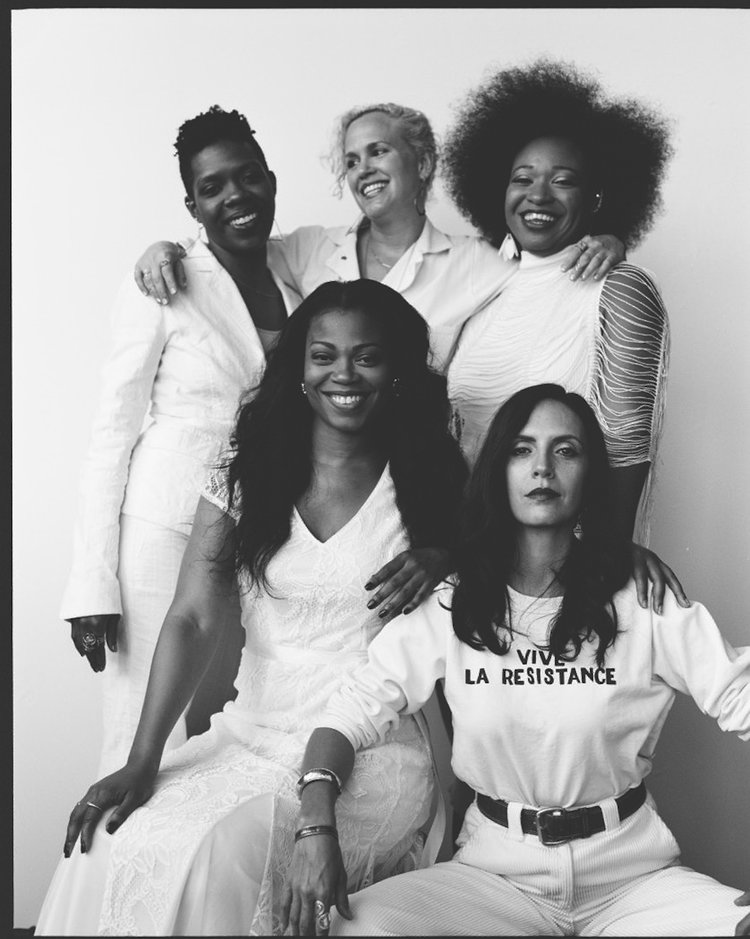
Tell us about yourselves…
Paola: Ginny and I were also co-founders of the Women’s March. I was artistic director, Ginny produced the march, and Sarah Sophie worked as a strategic adviser. While we were working, we realised, as Mr. Harry Belafonte put it, when the music is strong, the movement is strong. The movement was clearly very strong and what we needed to do was make the music strong.
How did you all come together?
Ginny: I reached out to tons of amazing women I’ve worked with in music throughout the years. Our concept was to come together and celebrate noise as a form of resistance, create a sisterhood to uplift protest songs from the past, and write new protest music.
What does it feel like when you perform?
“The movement was clearly very strong and what we needed to do was make the music strong.”
Shantell: I think building a community with song is something that is just indescribable until you come to a Resistance Revival night.
Arin: I feel the crowd is always uplifted. They feel the joy we’re bringing. We’re coming from different walks of life, uniting in this sisterhood, bringing the joy of music to the different issues affecting us all.
Why is activism important at this point in time?
Ginny: I think this is a very crucial time in our history. A lot of issues have come to the forefront that were taboo before – racism, sexism, equal pay, immigration were things that everyday people just didn’t talk about. So the good thing is, we have a lot that we need to work on, but the conversations are being had. Now we can empower ourselves and find a way to make the country better and make the world better.
What are the aims beyond music?
Meah: Daycare for moms is a painful and difficult endeavour, so we have our system set up to help mothers participate in the chorus. We are radically transparent with regards to finances, because we feel the secret nature around finances holds back particularly women of colour. With those two small examples, we’re trying to create an equitable system that is uplifting women.
Paola: Women [in music] are also grossly underrepresented and underpaid, so it’s our mission to create a platform through the Resistance Revival nights, to showcase and uplift women in music.
Best thing about New York?
Ginny: It’s one of the places with the most radical diversity of thoughts, intersections of race, ethnicity and income. People come together around issues who come from such vastly different backgrounds. It’s a city rich with ideas.
GREY COHEN, POP GYM
Pop Gym offers free self-defense, fitness, and skill-share classes to marginalized communities in a safe space in Brooklyn.
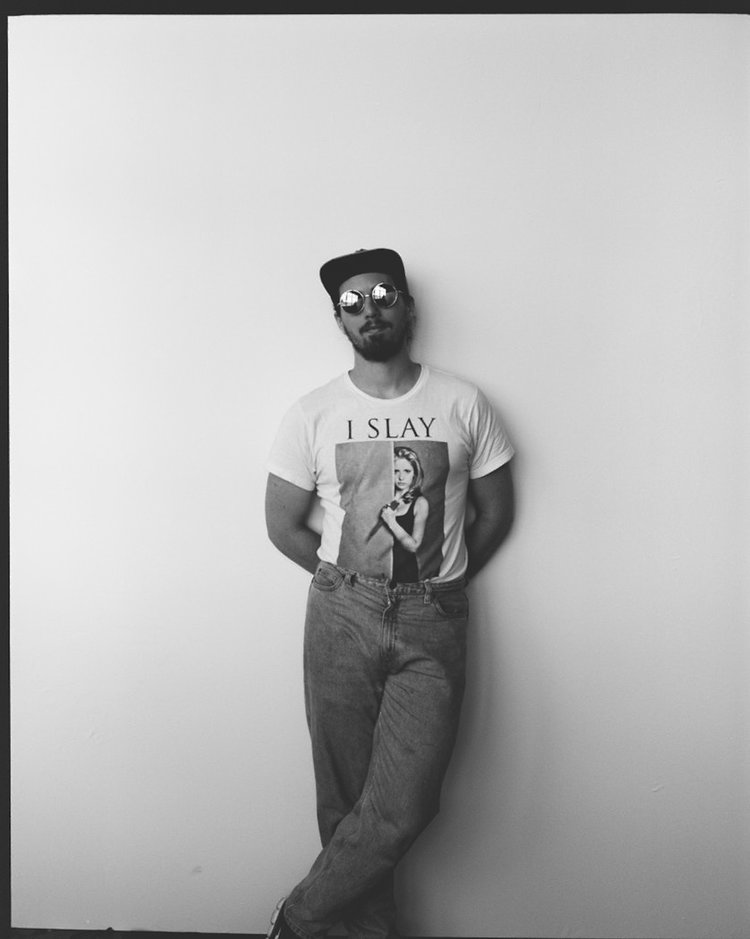
Tell us about yourself…
I bounced around a bit from the Tri-state area, moved to Brooklyn a few years back. I’ve been training in taekwondo since I was five or six, so I’m a third-degree black belt and I’ve done muay thai, jiu-jitsu, boxing, mixed martial arts. My parents wanted me to know how to defend myself!
What do you do apart from these workshops?
I also work with this group Cyber Collective. It’s in a similar vein, but for cybersecurity. I do odd jobs here and there, but my main focus are these organisations, because I really like to do them.
Why did you set up Pop Gym?
Really, it’s just a group of people, either that have a background in martial arts, or don’t but just want to create a space that was less macho, which, unfortunately, is the impression of martial arts: a lot of macho-ness and maleness and toxicity.
You offer free training to people from marginalized communities?
Yeah, our focus is to fill in the gaps where we feel like a lot of mainstream martial arts gyms cannot or do not. We’re an anti-racist organisation, we’re feminist, we’re body-positive and queer-positive. We want to be this place where a person can develop an interest, and go back to the gym with a little more confidence.
“We just want people to feel like they can and should take up space in the world, because they’re human and they have a right to exist.”
How needed are self-defense skills in New York?
Things happen in New York. There’s a reason people come to our workshops. Whether it’s femme folk concerned about getting assaulted, queer folk being gay-bashed, or trans folk being chased down the street. These are things that happen in New York every day, unfortunately. We just want people to feel like they can and should take up space in the world, because they’re human and they have a right to exist.
Three best things about New York?
Pride month in New York is the best! Just seeing so many people on the street, happy and being themselves. Two, I’m vegan, so I appreciate the food options. Three, I’m really appreciative of the people in the activist communities I’ve met. I feel kinship to them, I feel close to them, and they inspire me. Pop Gym is made for them and around them. Without them, New York wouldn’t be as fun.
MICHAEL VAGNETTI & HEATHER STEWART, EMPIRE STATE INDIVISIBLE
Empire State Indivisible is an Indivisible group with members from all five boroughs of New York City. Indivisible is a grassroots political pressure group that follows the tactics of the Indivisible Guide, a PDF that was circulated after the 2016 election by former Obama staffers.
Tell us a bit about yourselves and how you came to Indivisible…
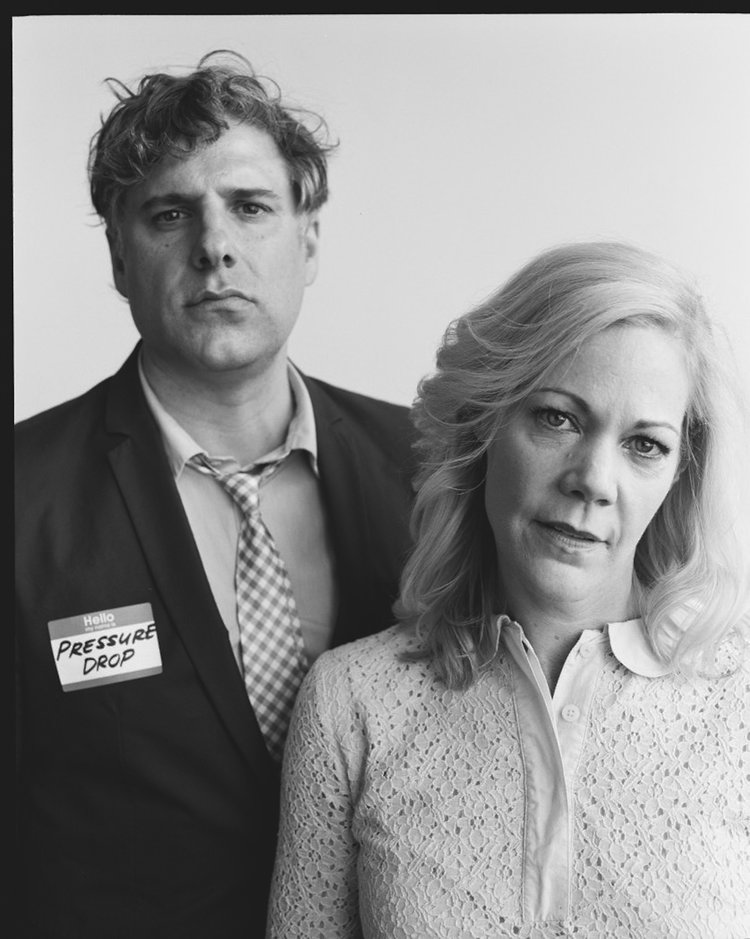
Heather: I came from the Midwest. I’ve had several different jobs since I’ve been here, the most recent of which is TV writing. What happened to me was there was just a rip in my psyche, I don’t know how else to explain it, after the election. I have a son, and realised I have to do something to move things forward and get through this time period. I owe it to him, since he’s watching me in tears every day. I was at home in St. Louis, and my dad voted for Trump. So I was miserable the entire time. Then I came across (the Indivisible PDF) and immediately it made sense.
Michael: I’ve been in New York since ‘98. From Michigan originally. I always voted, but I wasn’t political. The guide clicked with me because some research had went into it, and I like to dig underneath the surface. One of the mottos of the Indivisibles is how to make Congress listen, so it sounded like it would have a legitimate result. And our chemistry as a group just worked.
Has the focus of Indivisible shifted since then?
Heather: We have become more focused as Empire State Indivisible on the state of New York. So, we are looking very closely at the governor race and the state Senate. And as soon as we started to focus toward what was happening here, we realised we had a lot of work to do, and that was going to keep us plenty busy here. And, of course, the issues are the same.
National politics is complicated enough, but how do you get people motivated in state politics?
Michael: We almost had to discover a language to use in order to connect with people around issues that are complicated. They’re sometimes confusing and they change quickly.
Heather: We’ve watched, over the last year and a half, an electorate go from fairly unaware of what was happening in the state Senate to incredibly sophisticated. So that’s been wonderful.
“There’s a sense of the interconnectedness of this movement that is really powerful. I don’t think it’s completely dawned on people yet.”
How do you work with other organizations that work in these areas?
Michael: We’re a new group, and it’s really important for us to respect the work of other groups that have been doing this for years, if not decades. So we’re really sensitive to that. We will ask groups, “How can we help support your work?”
It’s a ‘network of networks’…
Michael: There’s a sense of the interconnectedness of this movement that is really powerful. I don’t think it’s completely dawned on people yet. So that’s something that I’m following. Like, I’m on a journey to find out where that leads, because people are starting to talk about it more.
Favourite things about New York?
Heather: I love the architecture. I love the neighbourhoods… And the diversity of the city. It’s the reason why I moved here.
Michael: I’m a book guy, so it’s the music and stores. And the ‘New York Minute’. I love the speed.
JESSE MANN, 350 BROOKLYN
350 Brooklyn is an affiliate of 350.org that works locally to solve the climate crisis through education, organisation, and direct action.
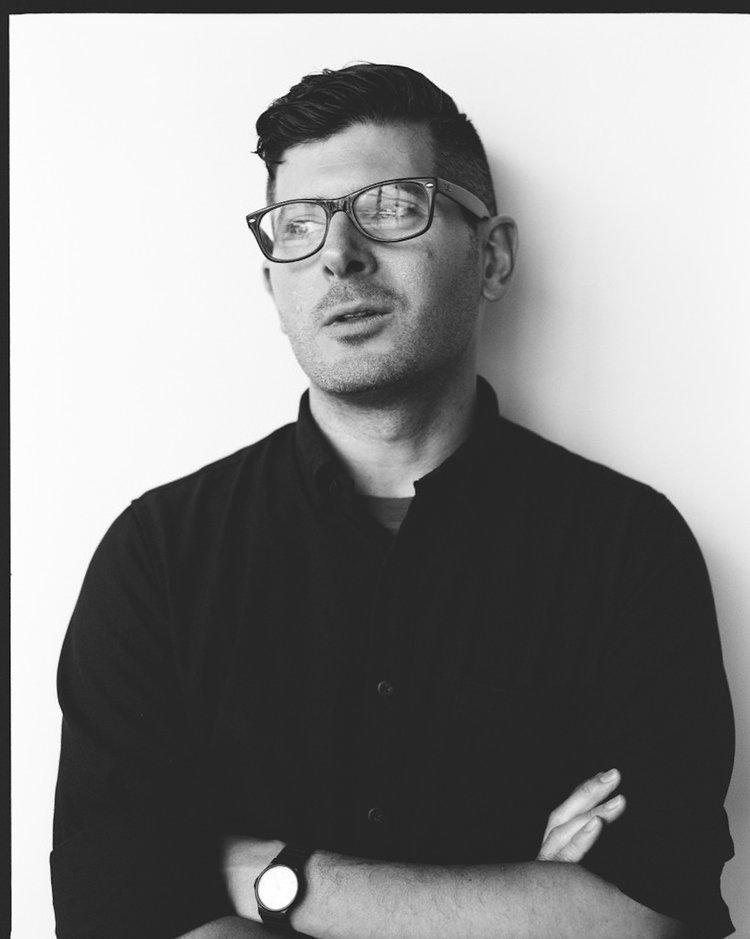
Tell us a bit about yourself…
I’ve been in New York since 1999, Brooklyn for 14 years. I work as a copywriter. I’ve always been aware of and conscious of environmental issues. When Hillary didn’t get elected, like a lot of people I freaked out and started reading about different organisations – I’d never gotten involved in activism before that. And I decided to go to a meeting for 350. The meeting was massive. They had a hundred people, whereas before that they were a group of 10 to 20.
Is it hard to confront the scale of the climate crisis?
I recognise the connections between climate change and so many other issues. The refugee crisis is a very obvious one. I heard they are projecting that by 2030, or 2035, there will be a billion climate change-related refugees worldwide. People are discussing refugee crises that are being exacerbated by climate change now, but climate change isn’t really part of the conversation. This gets to one of the big issues with climate change and how people talk about it. It is really complicated, and because it’s connected to so many other things, people can’t focus and nuance gets lost.
“Through activism of any form, it’s important to celebrate the victories when they happen because it’s always a struggle, it’s never-ending.”
Where does 350 Brooklyn fit into the wider conversation?
In New York alone, there are so many groups that are focused on climate change. There are more than a hundred. If you’re focused on a specific aspect, it may not be something that gets lots of headlines, but if you go deep on that issue, and you know who to talk to, who to put pressure on to make change, you might be able to actually make a small – not headline-grabbing – but still real piece of change, right? That’s one thing 350 Brooklyn does.
How do you stay motivated?
There’s a book I’ve been reading that’s helped me put some of this stuff in perspective, and … given me a bit of solace, I guess. It’s called Hope in the Dark by Rebecca Solnit. Her main message is [that] through activism of any form, it’s important to celebrate the victories when they happen because it’s always a struggle, it’s never-ending.
Favourite thing about New York?
I’m a DJ, and the incredible depth and breadth of the music scene here is amazing. Almost any night I want to go out and see someone else play music, I have to choose between two or even three people I really want to see.
Good Trouble is a digital publication about the movements standing up and fighting for a better world. It celebrates the culture of resistance, publishing stories from the intersection of arts and culture with politics and protest.
Read more and subscribe to Good Trouble here.
